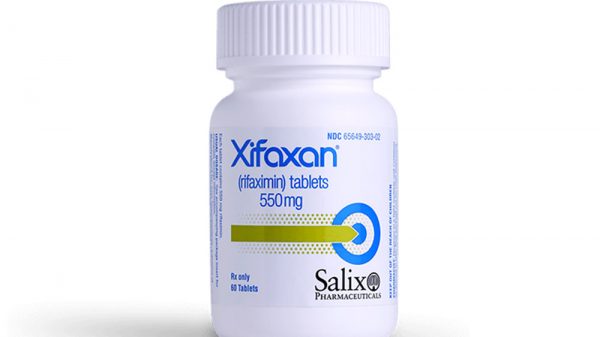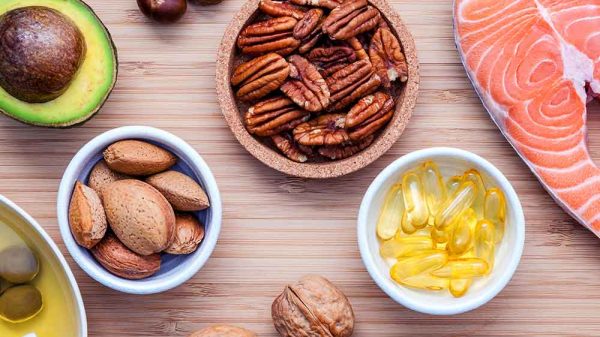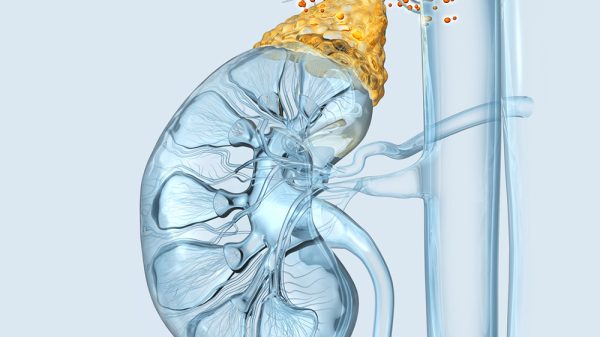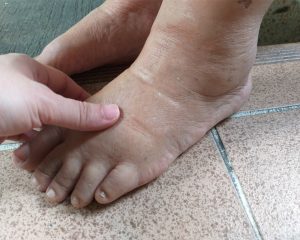Wet brain syndrome – also known as Wernicke-Korsakoff syndrome- is a disease of the nervous system that causes severe impairment and damage. This condition affects up to 2% of the population in the United States. (1) Most commonly, Wernicke-Korsakoff syndrome is the result of chronic alcohol abuse and subsequent vitamin deficiencies. Although Wernicke-Korsakoff syndrome can also arise as a result of nutritional deficits and malabsorption issues, in this article we will be specifically focusing on alcoholic wet brain.
Read on to find out everything you need to know about wet brain syndrome and what you can do to manage it.
What Causes Wet Brain?
Alcohol use disorder refers to the chronic consumption of alcohol. Chronic excess alcohol consumption can damage the lining of the stomach, preventing the uptake of thiamine. Over time, this pattern of alcohol abuse can lead to severe thiamine (vitamin B1) deficiency, resulting in wet brain. Plus, individuals with a substance abuse disorder like alcohol addiction are more likely to consume a poor diet that is deficient in essential vitamins and minerals.
Vitamin B1 is critical for facilitating metabolic processes, protecting the brain and nervous system, and supporting the body’s ability to harness energy from glucose in carbohydrates. In particular, vitamin B1 behaves as a cofactor that allows certain enzymes in the body to carry out their jobs.
Thiamine is a water-soluble vitamin, and the body doesn’t have any backup reserves of the crucial nutrients. As a result, it’s critical to get adequate amounts of thiamine on a daily basis. Lack of thiamine in the body can cause severe and life-threatening symptoms.
Symptoms of Wet Brain
Technically, Wernicke-Korsakoff syndrome is a compound of two neurological conditions: Wernicke’s encephalopathy and Korsakoff’s syndrome.
Wernicke’s encephalopathy is a condition that affects the hypothalamus and thalamus, causing severe cognitive impairments. Korsakoff syndrome, or Korsakoff’s psychosis, describes accompanying memory impairment. Symptoms will get progressively more severe in the absence of treatment. The National Organization for Rare Disorders describes the symptoms of Wernicke-Korsakoff syndrome: (1)
- Double vision
- Abnormal eye movements
- Mental Confusion
- Eyelid drooping
- Ataxia, causing lack of coordination and an unsteady gait
- Peripheral neuropathy
- Low blood pressure
- Tachycardia
- Impaired muscle coordination
- Loss of consciousness
- Seizures
- Confabulation or memory distortion
- Memory loss
- Difficulty forming new memories
- Hallucinations
- Psychosis
Can Wernicke-Korsakoff Syndrome Be Reversed?
The reversal of Wernicke-Korsakoff syndrome depends on how progressed the condition is and the extent of brain damage. Identifying wet brain in the early stages before extensive damage is key to resolving symptoms and preventing permanent brain damage. Wet brain that has been left untreated may cause permanent memory problems and cognitive issues.
Without treatment, Wernicke-Korsakoff syndrome can be fatal. If you are showing signs of wet brain, it is critical to seek medical attention immediately. Usually, wet brain cannot be treated at home and you must be hospitalized. While in the hospital, doctors and nurses will monitor your vitals and symptoms. Most likely, you will also be administered high doses of thiamine intravenously.
You Can Help Prevent and Manage Wet Brain
Though Wernicke-Korsakoff syndrome requires hospitalization, there are steps you can take at home to prevent the development of the condition or to further continue your recovery. The prevention and management of wet brain is two-fold and includes eating a nutritious diet rich in thiamine and avoiding alcohol consumption.
Eating a Healthy Diet Rich in Vitamin B1
When aiming for prevention of or continued recovery from Wernicke-Korsakoff syndrome, it is crucial to ensure that you’re getting adequate levels of vitamin B1 in your daily diet. Vitamin B1 can be found in a variety of foods. Strive to consume thiamine-rich foods on a daily basis. Foods that provide thiamine include: (2)
- Whole grains: Whole grains like brown rice, whole-grain bread, barley, oatmeal, and cornmeal offer thiamine.
- Enriched grains: Generally, it’s better to avoid refined grains like white bread, since these products have undergone processing to remove important nutrients like thiamine. However, enriched products have nutrients added back in to increase the nutritional value of the food. Look for enriched rice, pasta, and cereals.
- Seafood: Certain seafood products like tuna, mussels, and trout are rich in thiamine.
- Meat: Certain meat products like pork and beef contain thiamine.
- Other foods: Black beans, black-eyed peas, corn, acorn squash, and sunflower seeds contain thiamine.
- Supplementation: In many cases, it may make sense to take a vitamin B1 supplement to ensure that you’re getting the thiamine your body needs. Always follow the advice of your health care provider.
Managing Alcoholism
Alcoholism is one of the major causes of wet brain. However, managing alcoholism or alcohol use disorder is more complex than simply quitting drinking. Here are a few tips for managing alcoholism and therefore reducing your risk of developing wet brain.
Detoxing Properly
In order to recover from alcoholism, it’s important to first go through the detoxification process. Detox entails breaking the body’s physical dependence on alcohol. You should never stop drinking cold turkey since this can be life-threatening. Because detox from alcohol can be life-threatening, the process is often completed in an inpatient setting so doctors and other health care professionals can monitor you.
Some individuals may choose to detox at home, though it’s important to do so under the guidance of a physician on an outpatient basis. When detoxing at home, make sure to slowly taper your drinking over the course of a week to protect your health and reduce the severity of symptoms.
Mental Health Care
Breaking the physical dependence on alcohol is only the first step in treating alcoholism. Underlying mental health struggles are often tied to alcohol use, and treatment for any co-occurring conditions is vital for maintaining sobriety. Getting regular psychological support and guidance is also a helpful tool for alcoholism recovery, regardless of the presence of a mental health condition.
Seeking Support
Connecting with others on a similar journey can help you maintain sobriety. Support groups like Alcoholics Anonymous are vital resources for helping you stick to the recovery process and stay sober.
Replacing Old Habits
During alcohol addiction treatment, it is crucial to find new activities to help distract you from thoughts about alcohol. The time that you previously spent drinking is now available to fill with other healthy activities. Try learning a new skill, such as playing an instrument, painting, or speaking a new language. Or, get involved in outdoor activities like hiking or climbing. Trying new things will help you meet new people and fill your time with fulfilling and fun activities.
Surround Yourself with Life-Minded People
Surround yourself with people that encourage your success and sobriety. These individuals will hold you accountable to make the best decisions for your health and well-being.
Extra Diet and Lifestyle Tips for Supporting Recovery from Alcoholism
Alcohol consumption takes a toll on the body in every way. Here we go through some tips for supporting your health as you recover from alcoholism.
1. Eat Plenty of Fruits and Vegetables
Fruits and veggies play a vital role in the recovery from nearly any disease or condition. The vitamins, minerals, and antioxidants help the body heal from oxidative stress and inflammation. Excess alcohol consumption contributes to oxidative stress and inflammation in several organ systems, including the brain and liver. Increasing your intake of fresh produce during recovery from alcoholism may help reverse related liver conditions and support brain recovery. Aim to consume a variety of fruits and vegetables like broccoli, kale, spinach, bell peppers, celery, carrots, beets, and sweet potato to support healing from alcohol-induced damage.
2. Consume Plenty of Protein
Protein is an important component of any healthy diet. Dietary protein is made up of amino acids that the body needs to synthesize muscle tissue, neurotransmitters, hormones, and enzymes. In particular, the body requires balanced ratios of essential amino acids on a daily basis in order to function optimally.
Ensuring that you’re getting balanced ratios of essential amino acids is also critical for supporting the body during recovery from alcohol-induced liver disease. Essential amino acids help support hepatic metabolic processes and immune system function, while also fighting against muscle wasting that commonly occurs with liver cirrhosis.
You can get optimal ratios of essential amino acids from foods like low-fat cheese, nonfat milk, chicken breast, and fish. You can also obtain essential amino acids from vegetable proteins. However, it’s important to ensure that you eat a variety of plant-based proteins to get the optimal ratios that your body needs. Reach for foods like whole grains, nuts, seeds, and tofu.
3. Omega-3 Fatty Acids
Omega-3 fatty acids are vital for supporting brain health and reducing inflammation throughout the body. Excess alcohol consumption depletes the omega-3 fatty acids in the brain, leading to increased inflammation and oxidative stress. Foods rich in omega-3 fatty acids include salmon, sardines, mackerel, flaxseeds, chia seeds, pecans, and walnuts.
Things to Keep in Mind
If you are a heavy drinker and are concerned that you may be at risk for developing wet brain, it’s important to see your health care provider as soon as possible. Your doctor can recommend a treatment plan that works best for your specific needs.
Conclusion: What Is Wet Brain Syndrome and What Can You Do About It?
Wet brain, or Wernicke-Korsakoff syndrome, is a serious condition that causes vitamin B1 or thiamine deficiency. Lack of vitamin B1 causes serious neurological and cognitive symptoms. Heavy drinking is one of the primary causes of Wernicke-Korsakoff syndrome. When caught early, wet brain can be treated with high doses of vitamin B1. Treating alcohol addiction is a critical part of preventing the progression of wet brain symptoms. Detox, getting support, and eating healthy foods can help protect your body during recovery from alcohol abuse. If you or a loved one is showing signs of Wernicke-Korsakoff syndrome, it’s critical to seek medical attention immediately.
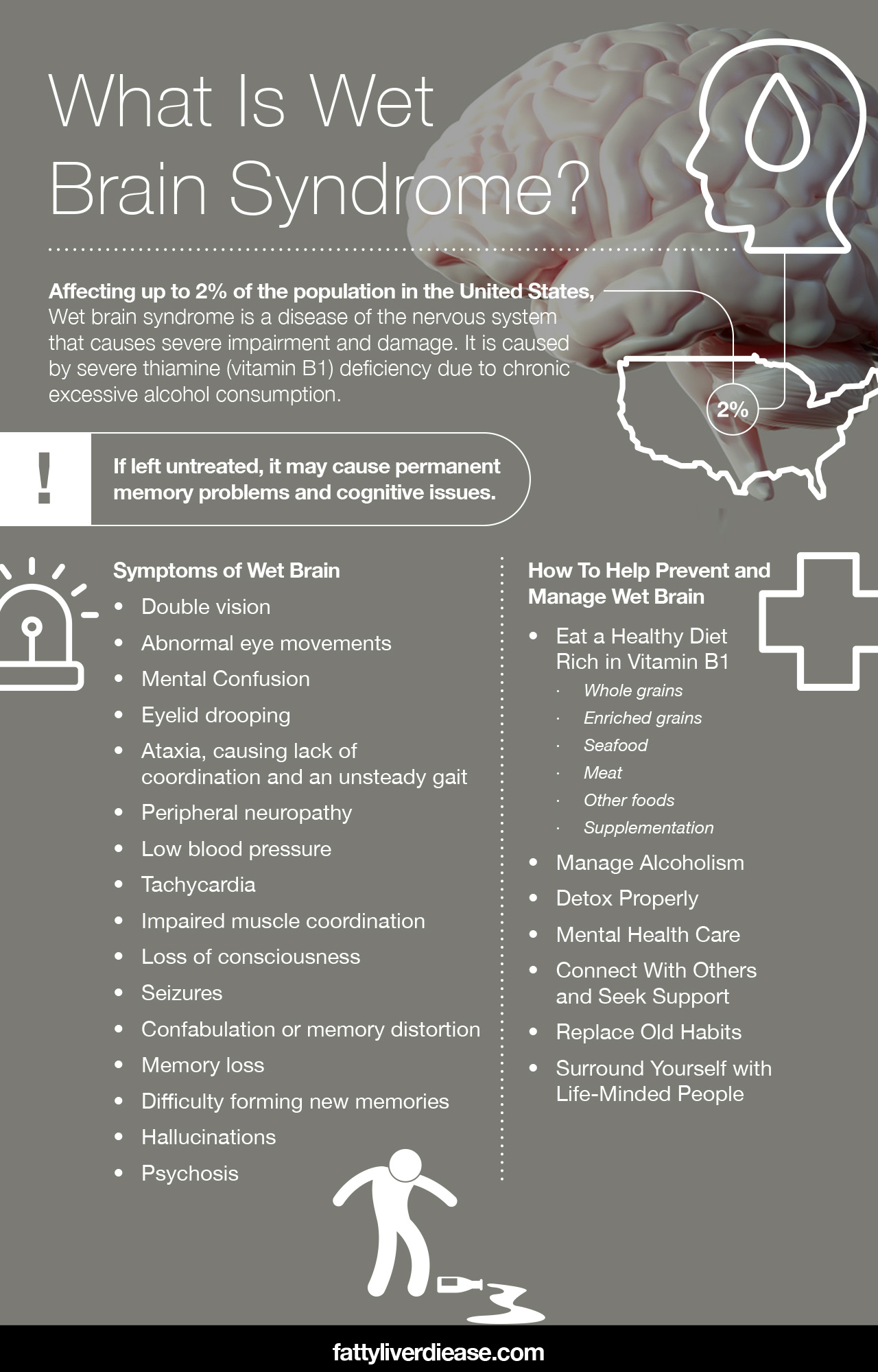
References:
(1) https://rarediseases.org/rare-diseases/wernicke-korsakoff-syndrome/
(2) https://ods.od.nih.gov/factsheets/Thiamin-HealthProfessional/

